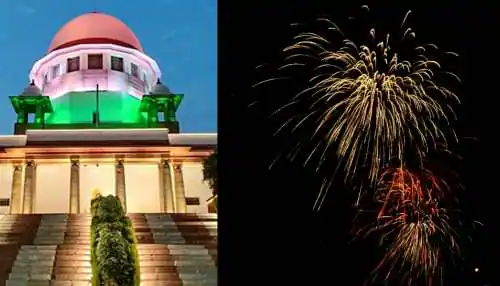Lagatar24 Desk
New Delhi: The Supreme Court on Wednesday allowed the use of green crackers for Diwali celebrations in Delhi and the National Capital Region (NCR) from October 18 to 21, setting specific time windows and strict regulatory measures to balance festivities with environmental concerns.
Strict Time Slots and Monitoring
According to the court’s order, green firecrackers will be permitted between 6 am–8 am and 8 pm–10 pm, while their sale will be allowed only at designated sites from October 15 to 25. A bench of CJI B R Gavai and Justice K Vinod Chandran clarified that only NEERI-approved crackers can be sold, and police will conduct surprise inspections to prevent violations. QR codes on cracker packets must be uploaded to official websites to verify authenticity. The Central Pollution Control Board (CPCB) and state PCBs will monitor air quality from October 18 and submit reports post-Diwali. Additionally, the court barred the sale of crackers imported from outside Delhi-NCR and warned that violators’ licences will be suspended.
Green Crackers Make a Comeback
Green firecrackers are designed to emit 20–30% less particulate matter than conventional fireworks. Manufacturers have welcomed the decision, arguing that legalising green crackers can curb black marketing and ensure safer products. Traders’ association member Rajeev Kumar Jain noted that new innovations offer up to 90% of traditional effects with cleaner emissions, and emphasised that banning crackers entirely could fuel illegal trade.
Environmental and Health Concerns Persist
Activists and health experts remain unconvinced. Bhavreen Kandhari pointed out that CSIR-NEERI’s data shows only a modest emission reduction under lab conditions, which becomes negligible in Delhi’s winter when pollutants get trapped. Parents have also expressed worries about children’s health amid already deteriorating air quality. Sunil Dahiya of EnviroCatalysts warned that additional emissions from crackers could push Delhi into the “severe” pollution category, exacerbating the existing burden from transport, construction, and power generation.







